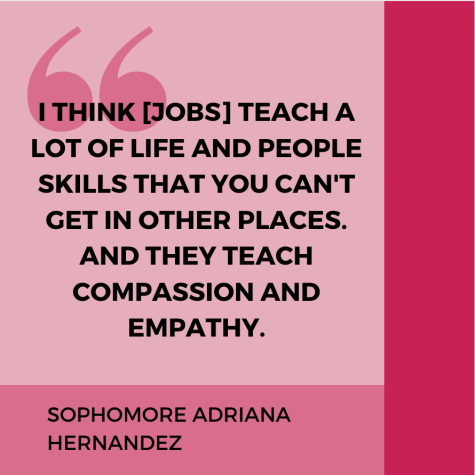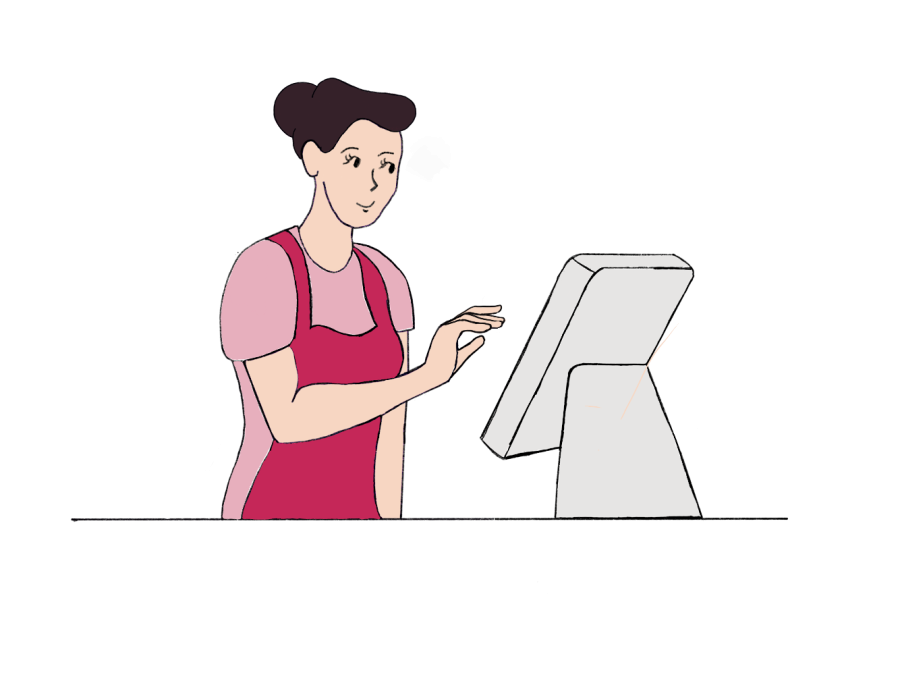A glimpse into the real world
Exploring the differences between jobs and internships
April 14, 2023
One of senior Gwyneth To’s favorite memories from serving as an activities assistant at a nursing home was celebrating a senior resident’s 101st birthday. During the festivities, To recalls hearing about the resident’s experience serving in the Coast Guard and writing an award winning novel. Although initially taking the position for the high salary and as a way to contribute to college and her senior trip, To says she has gained much more than money from the experience.
Like To, sophomore Adriana Hernandez plans to use the money she receives from the retail job she applied for to support her future college tuition. Hernandez also notes that the communication skills she developed through customer service are something she finds to be essential for any high schooler.
“Even if it’s just one job that you do, I really think that everyone should have a first job, especially before they go to college,” Hernandez said. “I think it teaches a lot of life and people skills that you can’t get in other places. And, it teaches compassion and empathy.”

While senior Iona Xia agrees that jobs help one learn interpersonal skills, the value of money and independence, she prioritized internships throughout her high school experience. Xia says internships help students more thoroughly understand a specific field through research — something she believes a job couldn’t offer.
Senior Jyotishko Koley also prioritized internships throughout high school, acting as a volunteer in a veterinary clinic. He, like Xia, found the real life experience invaluable and something not offered through employment.
“I think the internship was more beneficial because [in] high school the jobs will really be entry level. You won’t really get professional career experience necessarily,” Koley said. “ I think just taking the opportunity to get exposed to possible long term careers, even if it’s for no pay – I feel like that’s really valuable right now.”
In contrast, To, who has had both a job and an internship as an Alzheimer’s researcher, has found that because her job and internship were in related fields, she had beneficial experiences from both. For example, To mentions that through her internship, she was able to learn skills related to writing research papers. From her job, she was able to learn bedside manners and skills — both related to her future field of medical study, geriatrics.
“I think jobs are also a really great way to learn what you want to do,” To said. “Try and get a job that’s partially aligned with the field you’re interested in, and then it’ll really help you explore your options, as well as help you confirm whether or not you like your future job.”
However, To says assuming a part time job in fields less related to one’s future field of study might be better suited for summers or the second semester of senior year, when college application season has either not begun or ended.
Both Koley and Xia also mention this college-oriented perspective on obtaining jobs, focusing on obtaining internships up until their senior years before looking for jobs afterward. Their reasoning revolved in part around focusing on studies and also on appearances for college applications. However, Koley finds this mindset only strongly applicable to MVHS, mentioning that in other areas jobs are the standard, rather than internships.
Hernandez agrees with how the college-centric mindset at MVHS diminishes the priority of high school employment. She attributes this to her perception of MVHS’ location being largely middle-upper class, saying because needing money is not the driving force, students are less likely to search for employment. However, regardless of the reasoning for either partaking in a job or internship, she says both are valuable experiences and positive for college and beyond.
“An internship that shows a specific interest in a career field I think would be a bit better but I think jobs are equally as valuable,” Hernandez said. “As long as you explain what it is or why you chose to do a job whether it’s like helping your family or trying to accomplish something, it’s worth it.”
Xia feels similarly, placing emphasis on joy and fulfillment. She also notes that it is important to focus on discovery, rather than worry excessively about the immediate future.
“I think you should do whatever makes you happy,” Xia said. “At the end of the day having a job versus an internship won’t really matter in the long run. It’s more about exploring for your future career and being open to new experiences. That’s what matters.”



















